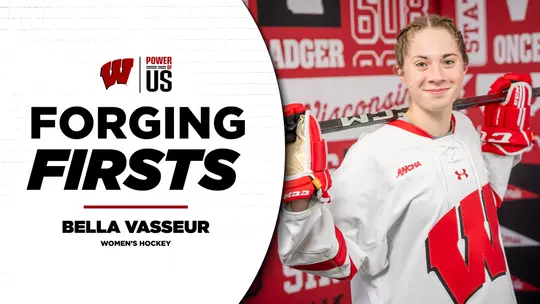
Forging Firsts: Bella Vasseur
Breaking the Ice - A Journey of Resilience, Support, and Mental Health
1/8/2025
"Forging Firsts" is a series that shares the stories of individuals who have accomplished remarkable achievements in their journeys. Each story, talks about when they became the “first” whether that is breaking records, facing challenges, or creating new paths. The series explores how these experiences helped them grow personally, uncovering new strengths and depths within themselves. "Forging Firsts" highlights the meaningful impact they have and how they’re inspiring others to follow in their footsteps.
Please be aware that this article discusses mental health. Mental health crisis resources are available by calling the UW-Madison 24-hour mental health crisis number at (608) 265-5600 (option 9)
I had a typical upbringing to start my life. I played hockey with kids of my age, loving the game as much as one can.
Things started to shake up once I got to high school. I grew up in Vermont, where hockey isn’t the biggest sport, especially women’s hockey. If you want to play Division One hockey, you can’t come straight from Vermont.
After spending a couple of years at a boarding school in-state – my mom decided that it was time for me to move up. My next boarding school was in Rochester, New York, which was six hours away.
Life was normal for a bit, I grew closer with some of my teammates, and I was playing well. But during my sophomore year, my parents got divorced.
My dad wasn’t the best. He never parented me a day in my life, always absent. The only way he involved himself was with hockey. A former player himself, he coached me until I went to boarding school. But he didn't go very far with it, and after seeing my potential, I guess he wanted me to have his dream. Whatever I did was never good enough, I always had to be better. He never said, “you did it,” it was always, “you need to work on this”. It was one part of a very poor relationship.
What made it harder was the fact that he was an addict. That could be such a weight on me, because no matter what, I was never his priority. Back home, he was treating my mother awfully, but she did her absolute best to protect me. The difference between how my mother raised me and how he did was astronomical.
After a game, my mom would always ask “do you want to talk about it?” And if the answer was no, she wouldn’t ask any further questions. She never criticized how I played. She wouldn't give me her advice because she said that I was the one on the ice, not her. She is my best friend.
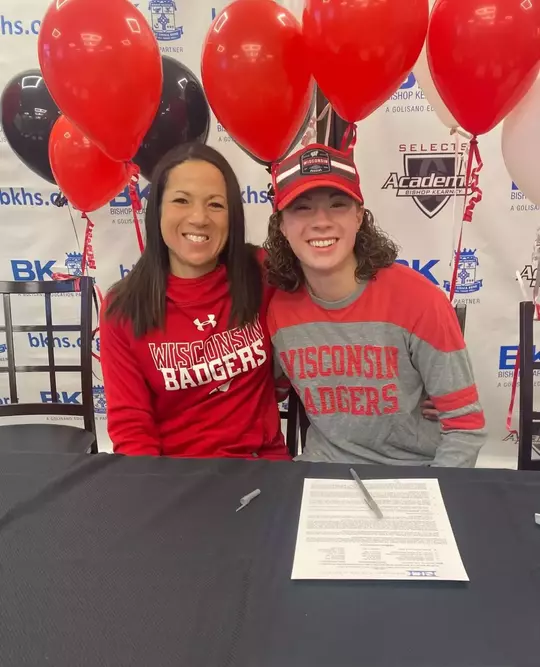
The divorce was a mess. At one point, my dad got out of control and started throwing my mom’s stuff out of the house. My mom and I ended up moving in with my grandma in her tiny house. It didn’t get any easier because Vermont is small, and our town was even smaller. I gained a lot of paranoia. There's only one grocery store in town and I found myself checking the parking lot before I would go in, just to see if he was there. Even when I was at school, I never felt free of worry.
I'm in no contact with him after he gave up his parental rights. But he still traveled to my games even after I said no. I’ve let some of that weight go, knowing that he’s now 20 hours away.
In order to take care of my mental health during this time, I had to learn that it's okay to do what’s necessary for yourself. I don't talk to my dad anymore, or any of his family. It was what I needed to be happy. With him in my life, I wasn't going to live to my full potential. I struggled with that decision for a while, but after some reflection I realized that I was doing great. That decision was possibly one of the hardest but best choices in my life. No one wants to cut out a parent from their life, but he wanted to take credit for how he got me here, even though he had no part in that. It’s easier now for me to set boundaries. I was such a people pleaser, and would give into people’s requests, but now I know when I need a break.
She never criticized how I played. She wouldn't give me her advice because she said that I was the one on the ice, not her. She is my best friend.Bella Vasseur (Talking about her Mother)
Even so, the whole ordeal took a toll on me. I went through burnout and hated hockey. I vividly remember a conversation I had with my mom, where she asked if I even wanted to play hockey. I was ashamed that I couldn’t come up with an answer. She had done so much to get me to here, it was sad that I didn't love it anymore.
But I’m someone who is extremely motivated and doesn't let a challenge stand in my way. My mom is a big motivator for that. I can't let her down, she was the first in her family to go to college, she’s battled breast cancer, and she had a tough childhood as well She’s never given up at any point in her life, so I decided that my past isn't going to stop me from making it either.
I stuck it out with hockey. I had an amazing rest of the year. During nationals, my coach told me that I lived up to everything I had put into this game. It was a turning point in my life. I realized I'm not a hockey player, I'm just a person who plays hockey.
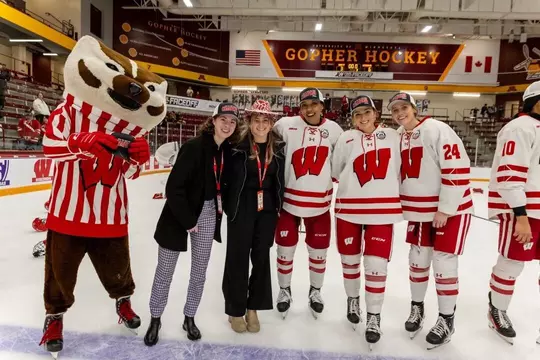
I was offered a spot on the University of Wisconsin’s hockey team. When I decided to accept, my mom and I prepared to say goodbye to each other again. But I thought about how I got here and what she’s done for me. She was the one who decided I should go to boarding school. She saw the potential in me even when times and I didn't, and she’s my biggest supporter through everything, both in hockey and in life. I wanted her to not have to get on a plane to see me succeed.
I asked, “why don't you come with me?” It wasn't the case of the mom who follows her kid to college, it was the case of the kid inviting her mom to college with her. Now we get to live right by each other.
In order to take care of my mental health during this time, I had to learn that it's okay to do what’s necessary for yourself.Bella Vasseur
I grew a lot in my freshman year of college. I immediately ran into problems when I needed to have shoulder surgery right before the first weekend of games. My only option was to redshirt.
Another injured teammate and I had to sit on the bench and watch practice, which is harder than people realize. We were sitting there and watching, not part of the inside jokes that happen on the ice or in the locker room. It was difficult and I felt very disconnected from the team.
I’ve always struggled with my mental health. As an athlete, you’re expected to not have anything else going on, but I had a lot going on, especially through high school. I felt like I needed to be in a good place all the time, and that made everything 10 times worse. When I decided that it was okay to be not well, that’s when I started getting better. Once you take that first step, things might get harder for a bit, but eventually you begin moving forward. For me, knowing that it was okay to not be doing well was a huge change in my life.
What helps too is having a community around me, which starts with my teammates. There's no way around it, you have to get close to them. You don't have to like all of them, you don't have to be best friends with all of them, but at the end of the day, they all have your back. Being around places like the Kohl Center or Camp Randall you meet other athletes too. I share a dorm with soccer, swim and dive, men's hockey, tennis and golf athletes. It's cool just to be able to say “hi” to them.
I even met my girlfriend of one year this way. We would pass by each other in the halls of my dorm, and we slowly started to interact more and more. It was during a difficult time in my injury recovery process. Sometimes it would physically hurt, other times it would mentally weigh on me that I couldn’t play, but she was there for me through all the ups and downs. She’s been a big part of my support system since I met her.
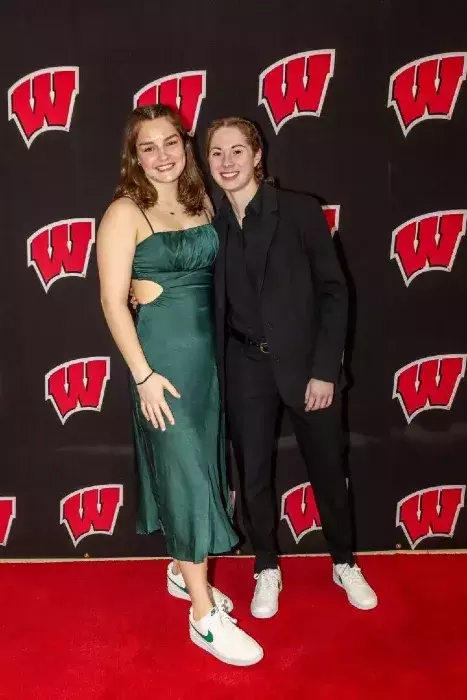
I made it through my freshman year and was fully recovered. At the beginning of this year though, I had another unrelated injury. This one wasn’t as bad, but I had to miss the first few series of the season. In some ways this was worse. At least last season I knew that I wasn’t going to play, but this season it was always a question that I had to endure.
Eventually though, in October, I got to be a part of my first game for Wisconsin. My only goal for this year was to put the jersey on. I've been here for a year and a half, but I’ve never put the jersey on for a game.
I didn't play a shift in my first game suited up, but I didn’t care. I was just happy to be on the bench. I never experienced that.
During the second game though, I got to see the ice.
As surreal as it was, the best part was that, in the stands, my mom and my girlfriend were sitting next to each other. With everything I’ve been through with my dad and my injuries, it was so meaningful to see the two people who helped me through it all. They were just as excited as I was. It still doesn't feel real to me. I had changed so much, since I started playing hockey and it all led me to this moment – wearing that Wisconsin jersey, in a great atmosphere, being watched by my biggest supporters.
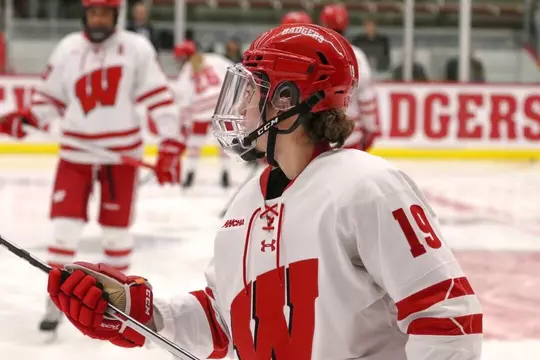
More people are affected by this every day. The stigma around mental health is still around, but it’s also become easier to talk about with all the people speaking out. That’s the world we live in today, there are things that give people the confidence and power to speak out. The first step is having the support from the outside community and not just limiting the speaking to athletes. It's easy to dismiss something when it's brought up by someone in the circumstance. But when someone on the outside sees what is going on and speaks up about it, that's when people start taking things seriously.
